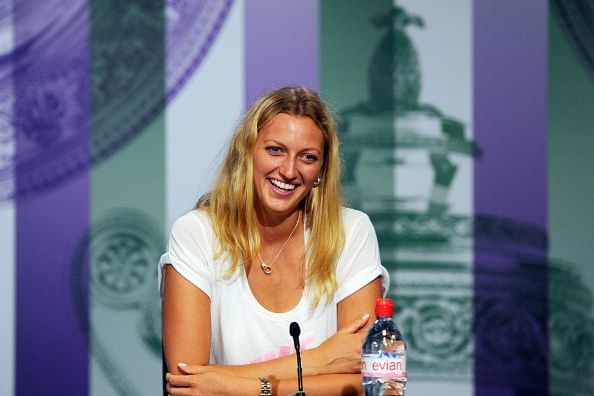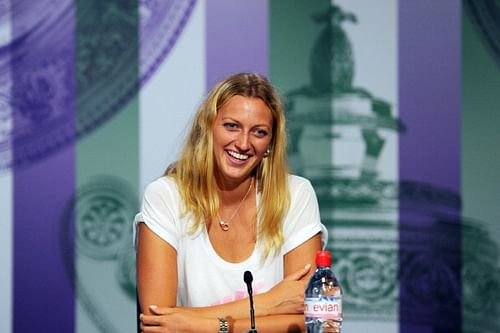
Wimbledon 2014: Pushing the boundaries of the possible with Petra Kvitova

Nobody wanted to say it out aloud, but a lot of people were thinking it: if the Wimbledon championships produced another women’s final as horrific as the 2013 one, the WTA would have a hard time justifying equal prize money for men and women. It’s never a pretty sight to see the biggest stage in the sport be reduced to a trainwreck of nerves, shanked groundstrokes and pitiable tears, even if the protagonist of it all is as likeable as Sabine Lisicki.
We did get two likeable players in the final again this year, and we also got another beat-down of epic proportions; if anything, the scoreline was even more one-sided this time. But nobody could mistake this display as an embarassment for women’s tennis. Petra Kvitova was just so good, so thrillingly dominant, that the 2014 Wimbledon women’s final quickly turned from a cringeworthy massacre to a brilliant advertisement of the sport.
Kvitova’s 6-3, 6-0 hammering of Eugenie Bouchard may well be viewed for years to come as the very embodiment of perfectly executed offensive tennis.
You may hear this several times over the next couple of days, but the 20-year-old Canadian didn’t play a bad match by any stretch of the imagination. She put more than 60% of her first serves into play, struck just two double faults and committed a mere four unforced errors all match.
Admittedly though, the phrase ‘all match’ is a bit misleading here; when a contest lasts just 55 minutes, most of which seemed to go by in a blur of flying winners and mammoth serves, it’s hard to extrapolate much from the statistics.
What could Bouchard have done differently? Could she have switched to a Plan B to impose her game on the left-handed Czech? Was there any way she could have put up a more respectable final scoreline?
The answers to the above three questions are: 1. nothing; 2. no; and 3. yes – she could have hoped that her opponent rolled over and simply refused to hit the ball.
That is how well Kvitova was striking the ball today. There was an uncommon ferocity to her groundstrokes that seemed to make even the blades of grass on Centre Court quake with fear. She took the ball early, timed it sweetly and directed it to the corners with such ruthless efficiency that at times it looked like she was the only player on the court.
The final numbers show that Kvitova hit 28 winners to 12 unforced errors, and four aces to three double faults. But what the numbers don’t show is how thoroughly she nullified all of Bouchard’s strengths, turning the match into a non-contest well before the final shot was struck. Kvitova took all the time away from the Canadian, treated her hitherto effective serve with obvious contempt, and even defended better than the 20-year-old, something which didn’t seem possible before the start of the match.
Bouchard could have done a million things differently, but the result would have been the same. There was simply no answer to the Czech’s combination of wicked lefty serve, humungous forehand and bone-crunching backhand.
When Kvitova is playing this way, it’s hard to describe her tennis as anything but perfect. It’s also hard to comperehend why she has won just two Major titles so far, or why she so frequently descends into whirlpools of ghastly errors and frightfully poor shot-making.
Then again, perfection is not normal; humans aren’t supposed to be flawless. In her quest to achieve the offensive ideal whenever and wherever she plays, in her desire to end the point on her terms no matter how desperately she may be cornered, Kvitova often ends up erring on the wrong side of the line that separates genius from insanity.
But does that matter, when she can summon her best on the biggest stage of them all? With two Wimbledon titles now, Kvitova can legitimately claim to be the best active grasscourt player after the Williams sisters and Roger Federer. Even before her win this year, she considered Centre Court to be something like her house, and she has usually played the part; this is the fifth year running that she made the quarterfinals or better.
Kvitova will likely continue to have her inner struggles, even after a performance as stunning as this. One win doesn’t make your problems magically disappear, and the inconsistencies that plague her so regularly will return, perhaps even on grasscourts. There’s a reason why she has a mental coach along with a physical trainer; sad as this may sound, Kvitova was probably not born to be a composed champion that stood tall under every circumstance.
But she never stops trying, and from where I’m looking, that’s the most anyone can ask of her. In the ultra-competitive world of professional tennis, there is not a single moment to rest and Kvitova, bless her heart, never does. She does the long hours on the practice courts, she fights through her asthma issues and she puts the bad days behind her. And the result of all that may not be year-long consistency or unstoppable dominance of the women’s tour, but the occasional moment of glory when the stars align and the strokes stay within the lines.
Three years ago Kvitova put in a similarly jaw-dropping performance on Centre Court, a display that prompted many, including yours truly, to anoint her as the future of women’s tennis. This time, we won’t make the same mistake; in fact, I’m willing to bet that the Czech won’t end the year ranked No. 1 in the world. But when I see that smile of unbridled joy light up her shy face as she cradles the Venus Rosewater dish with the resounding applause of the All-England Club’s patrons washing over her, I know that none of that really matters.
When you are a Wimbledon champion, you are a Wimbledon champion. Everything else simply fades into the background.
Three years may seem like a long time, and it is; a lot has happened since 2011. One thing hasn’t changed though; in her first Slam final appearance, Kvitova put up a display of absolutely dazzling tennis the like of which most of us had never seen before. In her second final appearance, she did the exact same thing, pushing the boundaries of what we thought ‘possible’ in the game of tennis even further.
If for nothing else, Petra Kvitova deserves our gratitude for that.